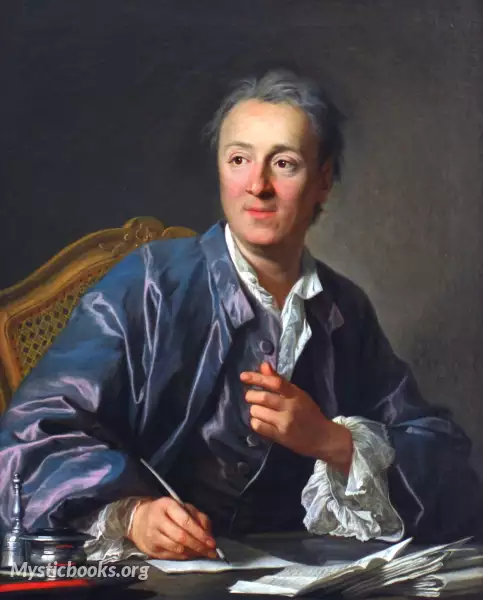
Timeline
Title
Country/Nationality
Denis Diderot
Denis Diderot was a French philosopher, art critic, and writer, best known for serving as co-founder, chief editor, and contributor to the Encyclopédie along with Jean le Rond d'Alembert. He was a prominent figure during the Age of Enlightenment.
Diderot initially studied philosophy at a Jesuit college, then considered working in the church clergy before briefly studying law. When he decided to become a writer in 1734, his father disowned him. He lived a bohemian existence for the next decade. In the 1740s he wrote many of his best-known works in both fiction and non-fiction, including the 1748 novel The Indiscreet Jewels.
In 1751, Diderot co-created the Encyclopédie with Jean le Rond d'Alembert. It was the first encyclopedia to include contributions from many named contributors and the first to describe the mechanical arts. Its secular tone, which included articles skeptical about Biblical miracles, angered both religious and government authorities; in 1758 it was banned by the Catholic Church and in 1759 the French government banned it as well, although this ban was not strictly enforced. Many of the initial contributors to the Encyclopédie left the project as a result of its controversies and some were even jailed. D'Alembert left in 1759, making Diderot the sole editor. Diderot also became the main contributor, writing around 7,000 articles. He continued working on the project until 1765. He was increasingly despondent about the Encyclopédie by the end of his involvement in it and felt that the entire project might have been a waste. Nevertheless, the Encyclopédie is considered one of the forerunners of the French Revolution.
Diderot struggled financially throughout most of his career and received very little official recognition of his merit, including being passed over for membership in the Académie française. His fortunes improved significantly in 1766, when Empress Catherine the Great, who heard of his financial troubles, paid him 50,000 francs to serve as her librarian.He remained in this position for the rest of his life, and stayed a few months at her court in Saint Petersburg in 1773 and 1774.
Denis Diderot was born in Langres, Champagne. His parents were Didier Diderot a cutler, maître coutelier, and Angélique Vigneron. Three of five siblings survived to adulthood, Denise Diderot and their youngest brother Pierre-Didier Diderot and finally their sister Angélique Diderot. According to Arthur McCandless Wilson, Denis Diderot greatly admired his sister Denise, sometimes referring to her as "a female Socrates".
Diderot began his formal education at a Jesuit college in Langres, earning a Master of Arts degree in philosophy in 1732. He then entered the Collège d'Harcourt of the University of Paris. He abandoned the idea of entering the clergy in 1735, and instead decided to study at the Paris Law Faculty. His study of law was short-lived however and in the early 1740s, he decided to become a writer and translator. Because of his refusal to enter one of the learned professions, he was disowned by his father, and for the next ten years he lived a bohemian existence.
In 1742, he befriended Jean-Jacques Rousseau, whom he met while watching games of chess and drinking coffee at the Café de la Régence. In 1743, he further alienated his father by marrying Antoinette Champion a devout Roman Catholic. The match was considered inappropriate due to Champion's low social standing, poor education, fatherless status, and lack of a dowry. She was about three years older than Diderot. The marriage, in October 1743, produced one surviving child, a girl. Her name was Angélique, named after both Diderot's dead mother and sister. The death of his sister, a nun, in her convent may have affected Diderot's opinion of religion. She is assumed to have been the inspiration for his novel about a nun, La Religieuse, in which he depicts a woman who is forced to enter a convent where she suffers at the hands of the other nuns in the community.
Diderot had affairs with Mlle. Babuti Madeleine de Puisieux, Sophie Volland and Mme de Maux. His letters to Sophie Volland are known for their candor and are regarded to be "among the literary treasures of the eighteenth century".
Books by Denis Diderot

Rameau's Nephew
It is a conversation between Rameau's nephew and his friend, known simply as "myself". It's philosophical and moral in nature, with music mixed in. Rameau's nephew asserts that he wants all the best things by doing the least amount of actual work, an...

Merkwürdiges Beispiel einer weiblichen Rache
Friedrich Schillers Übertragung der "Mme de la Pommeraye"-Episode aus Diderots "Jacques le Fataliste", erschienen 1785.Aber die kühne Neuheit dieser Intrige, die unverkennbare Wahrheit der Schilderung, die schmucklose Eleganz der Beschreibung haben...

Regrets sur ma vieille robe de chambre
Regrets sur ma vieille robe de chambre fut écrit suite à une offre de Marie-Thérèse Rodet Geoffrin d'une nouvelle robe de chambre qui fit regretter à l'auteur l'ancienne. (Résumé par Enko)